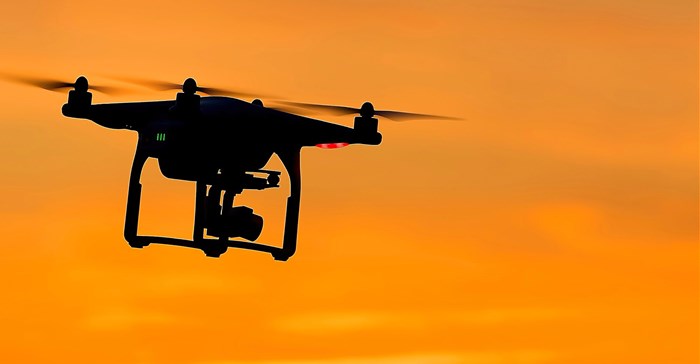The Eastern Cape farming community has implemented the use of drone technology, as a means to improve security, boost productivity and help reduce escalating costs. According to farmers' organisation Agri Eastern Cape, the use of drones will play an integral part in farming operations moving forward.
More and more farmers are starting to use drones to do quick spot-checks on their farming operations without having to waste time trekking to remote areas on foot. This ranges from checking that boundary fences are secure, to checking on livestock, watering points and other critical operational issues.
Joseph Ott, a conservation manager at a private reserve near Graaff-Reinet, said he started using his drone a year ago and has been reaping the benefits ever since. "We did some research and quickly realised that drones could make a huge difference to increase efficiency to gather critical information quicker and at a lower cost [than labour and transport]."
"Saving time collecting information is part of our monitoring and evaluation of our various conservation projects and is crucial to any farming and wildlife operation. Before, a large amount of time was taken up walking to various parts of the reserve [for inspections and monitoring]. The use of a drone, cuts that work down by more than 50% allowing me to do more in the same amount of time. It’s a win-win situation any day of the week!"
Increase in identification, tracking capabilities
Ott adds that the drone allowed "the capability to search for very specific animals within a herd as well as local animals in inaccessible areas of the farm". "The drone allows us to track animals, identify erosion areas and grazing impacts far more efficiently than in the past. We also use the drone for other operational purposes including the monitoring of soil erosion, stock, veld types and conditions, fences, security and infrastructure patrols."
Chris Lee uses his drone on his 6,800 hectare Angora goat farm, Claremont, near Jansenville. He says his primary aim in investing in the drone was to cut back on labour costs. "All too often, when stock has been rounded up, we find that some of them are missing. Rather than taking valuable time to head back into the veld [to look for them], it is easier to send up a drone to search for them."
"Angora goats hide very effectively in bush or Spekboom without being spotted. But now I can fly my drone overhead and have a clear view of where they are. When I have tracked them down using the drone, I can set off to bring them back while my staff concentrate on their work at hand. It’s a simple question: What is my time worth to me?"
Saving lives of valuable livestock
A secondary reason behind Lee’s decision to introduce drone technology was to deal with feral dogs which attack his livestock. "We are close to town, and they are often a problem. We can use the drone to check whether they are on the farm, where they are, and then follow them. This can save the lives of valuable livestock."
Agri EC president Doug Stern says farmers are increasingly looking to technology in the face of rising input costs. "Labour in agriculture is becoming very expensive and so drones will, to a large extent, assist farmers in this aspect – especially over weekends and public holidays when labour comes at an even higher cost [due to extra payment for staff working on a weekend or public holiday], or because labour may not be available to the farmer then.
"Furthermore, farmers can quickly, with the use of drones, inspect and check all the necessary stock waters and the condition of animals that would ordinarily have to be done by labour. The implications are massive," concludes Stern.



























